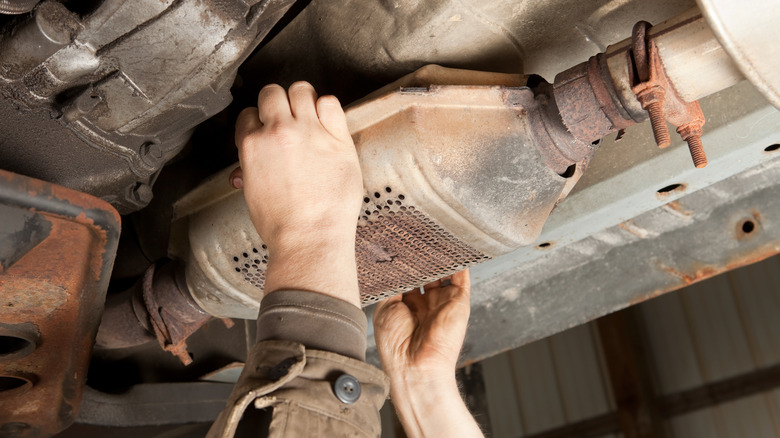Does Catalytic Converter Cleaner Actually Work? What To Know Before Using It In Your Car
While catalytic converters regularly appear on the news as increasingly-targeted stolen items, they're an important part in vehicles. For those who aren't gearheads or auto enthusiasts, the primary function of a catalytic converter is to reduce toxic pollutants. It's a metal canister that sits under the car between the engine and muffler. Inside, a metallic honeycomb element converts hazardous gases such as carbon monoxide, nitrogen oxide, and unburned fuel particles spewed from the engine into much less harmful things like water vapor and carbon dioxide. It then passes those innocuous gases to the muffler for expulsion into the air.
When properly maintained, a catalytic converter will typically last more than 100,000 miles, possibly even for the entirety of the car's life. Of course, driving habits, environment, and time will take their toll in the long run. That said, there are options to help extend the life of your catalytic converter, cleaners. One way to properly maintain a catalytic converter is to use one of the many off-the-shelf cleaning products available. Using a catalytic converter cleaner will likely improve your vehicle's performance, but it's not guaranteed. But even if the catalytic converter is too far down the road, $20 – $30 to find out is worth the minimal cost.
Cheap, easy, and usually plenty effective
Most catalytic converter cleaners simply require you to pop the top, pour it into the gas tank (usually with about a quarter tank left), and drive the car for approximately 15 minutes to ensure the magic elixir works through a heated engine to the converter. These specially formulated cleaners contain ingredients like acetone, isopropanol, xylene, and kerosene, which work to break down deposits in the fuel system and clean parts like oxygen sensors, cylinder heads, intake valves, and fuel injectors.
Before pouring anything other than gas into the tank (like WD-40), make sure the cleaner is suitable for your vehicle. Several universal products can be used in gasoline, diesel, or hybrid engines and are typically the most foolproof. No matter what brand you buy, follow the directions on the back of the bottle to the letter, as shooting from the hip here might cost you more than if you'd just left it alone.
